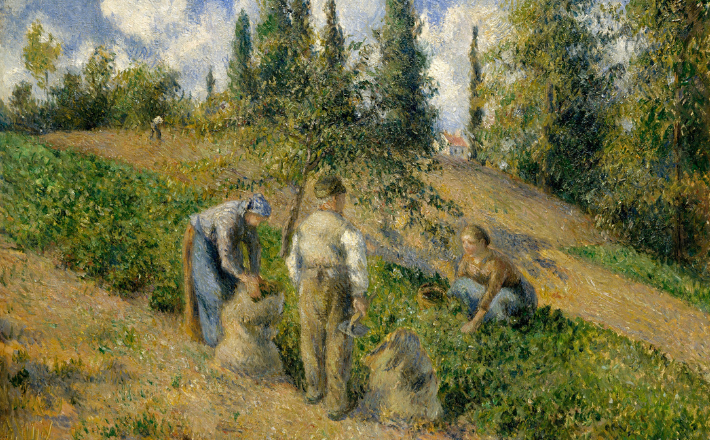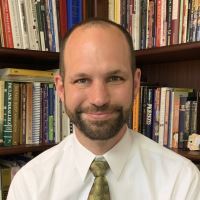Commentary on Isaiah 66:10-14
At the close of the book of Isaiah, God and the prophet(s) choose to use specific anatomical metaphors of a woman giving birth and then nursing her children to give the fullest sense and most immediately relatable image of God’s loving care for the citizens of the New Jerusalem. My wife has given birth to three boys, all unmedicated births, and two at home.
Birth is terrifying and dangerous. There is a lot of pain and, at least in our case, the very real chance of hemorrhaging from too much blood loss. And yet, when the babies latch on and start to nurse at their mother’s breast, it is a great comfort to the child ejected out into the cold world, and can potentially help save the life of the mother by lessening bleeding. Oxytocin—“the love hormone”—flows through the mother’s body, contracting her uterus and flooding her with dreamy enjoyment of her newly birthed child. This is the context of Isaiah 66 that the reader must be able to call to mind. Blood, milk, and liquid delight (oxytocin) are crucial to understanding the passage.
In order to properly dig into verses 10–14, we must start in verse 7. This is the first in a series of doublets, with “rhyming ideas” as a standard feature of Hebrew poetry. Two impossible happenings around birth are named: 1) A woman gave birth before experiencing labor, and 2) she gave birth to a son without pain (66:7). Then the prophet asks a double question: Who has heard/who has seen this? The rhetorical question is meant to provoke an emphatic “No one!” and perhaps some rueful chuckles from the women who know better. The then-prophet applies the anatomical impossibility to the (re-)birth of the people.
Again, the prophet asks a double rhetorical question, again assuming an emphatic “No!” “Shall a land be birthed in a day? Shall a nation be delivered in an instant?” No, of course not. It takes time, sometimes decades or centuries, for a sense of peoplehood to coalesce. It takes still longer for independence movements to unite people with their own land. But these are the miracles God intends—and promises, again using a double question. “Shall I open the womb and not deliver … Shall I, the begetter [or, potentially, the midwife] shut the womb?” No, of course not. As soon as Zion began labor, she delivered her children (66:8)!
The birth of a child is such a precarious and emotional moment. The mother has experienced (and will continue to experience, let’s be honest) great pain. Is her bleeding under control? Is the child breathing? Is the child healthy? What do both baby and mama need? At the same time as the fear and pain, it is (can be) an instant of pure joy and celebration! The work of many months has produced new life! Sure, it looks like an alien now, but that baby is going to be super cute in a couple of weeks!
The text insists that the reader seize the opportunity to celebrate with Jerusalem! Too many thousands of her citizens have been killed by the Babylonians and then have been lost in exile. This is a time to rejoice with Jerusalem at the birth of her new people, just as we mourn(ed) the loss of her denizens previously.
But birth is by no means the end of the story. The baby needs comforting and calories, and the mother needs her baby to reattach! The prophet/poet uses the gritty and beautiful language of expressing colostrum to describe how Jerusalem as mother will satisfy and provide for the returnees from exile. Here, the text speaks of Jerusalem’s “breast of comfort” intentionally, linking this passage at the end of Isaiah to the proliferating descriptions of comfort throughout the book (1:24; 12:1; 22:4; 40:1; 51:3, 12, 19; 52:9; 54:11; 57:6; 61:2; 66:13).
The language here may initially cause some awkwardness for the preacher or some tittering in the congregation, but the anatomical specificity of the Hebrew must be allowed to shine through. The second half of verse 11 speaks of the returned exiles’ guzzling (the word matzatz is an onomatopoeia meant to evoke the sound of an infant sucking) with delight from Jerusalem’s “glorious bouncing/moving/abundant things.” Some translators will demurely choose “glorious abundance” or some circumlocution, but the New American Standard Bible and New Revised Standard Version Updated Edition rightly render “bountiful breasts” and “glorious bosom,” respectively. The language is meant to be a little crass as it discusses hyper-abundance and delightful fullness.
God returns the metaphor of nutritious, sustaining liquid to the geopolitical sphere, saying that the wealth of nations and peace will flow through Jerusalem into her residents like rivers and overflowing streams. Then the prophet deploys the apex of mothering metaphor in threefold action: The children of Jerusalem will 1) breastfeed from the peace and wealth that flows to Jerusalem, 2) be carried in the arm and on the hip of a protective Jerusalem, and 3) be bounced on the knees of a Jerusalem enchanted and delighted with her returned children.
This is what God desires. Just as a human mother feeds, protects, carries, and plays with her child, so God longs to do with God’s children. Here now, we have the theme of movement from affliction to comfort, which has characterized the scroll of Isaiah from beginning to end.
And just as the rest of the prophecies of the scroll of Isaiah have been polyvalent, so is this image of God and Jerusalem sharing the mothering of a newly (re-)born people. Isaiah and his prophet wife had a child, named Immanuel, whose birth was a portent of delivery from the allied Arameans and Israelites. And at the same time, Christians hear in Isaiah 7 prophecies of the birth of Jesus. In Isaiah 66, God promises the celebrations of birth and the protection and care of a devoted mother to the returnees from Babylonian exile.
And—not “but”—verse 14 extends the scope of the good news to a future date, when God will cause hearts to rejoice as faithful servants are affectionately embraced and those committed to destruction will feel God’s displeasure. Jerusalem is pictured as a mother in this chapter, but the true protecting, providing, and defending mother is God, who rescues children and provides for them in the past, present, and future.


July 6, 2025